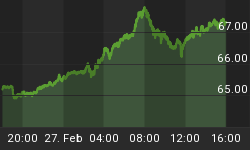It is amazing to reflect on the fact that the stock market last week experienced its worst 5-day span to open the year ever. I haven't independently confirmed that; it seems incredible to me that in a hundred and whatever years we have never started with a 6% loss - but that is what is being widely reported. In any event, it has been a bad start and the market is back to the levels it last saw in August, before the inexplicable Q4 blast-off. Easy come, easy go.
Why is the market down? The harder question is the question of why it was up in the first place. Stocks have been persistently far above fair value measured by CAPE, Tobin's Q, or any other traditional value metric. The argument that stocks were high because bond yields were low is perhaps the best explanation; this is after all part of the whole "portfolio balance channel" effect that the Fed has been trying to create with QE - raise the price of a good (bonds) and the prices of substitutes (corporate bonds, stocks) should also rise. (Left unsaid, of course, is why it is a good thing to move asset prices away from fair value. The 'wealth effect' is small, and zero-sum at best unless prices can permanently be moved away from fair value.)
But if this is the explanation for sky-high stocks, it doesn't explain why commodity indices - which are obviously also a substitute for stocks and bonds - are at multi-decade lows. Why should the price of that substitute move in the opposite direction? Before you say "weak global growth," or "overproduction" (as this article has it) remember that not only is oil low, but so is Corn. And Hogs. And Sugar. And Cocoa. What, are we overproducing everything? Is China not eating, either?
I actually really like that article. When oil was at $120, everyone (including fancy Wall Street dealers) published breathless articles about $200 oil. Today I saw an article saying oil is going to $10 - which would be the lowest real price, I think, since oil was discovered. This article could have been written any time in the last 20 years and pointed to some new mine, or crop production technique, or oil field, or railroad, or the development of horizontal drilling, etcetera. It's just when prices are very low that this is suddenly viewed as an epiphany that Aha! This must be why prices are low! There are big mines opening!
There are, of course, some problems of overcapacity in some commodities because cheap money made possible, for example, the massive draws from Baaken shale. But overcapacity in every commodity? Overcapacity in gold?
And global growth is, indeed, weakening. I would caution any analyst that wants to read into the surprising strength of Friday's Payrolls report. It is a December measurement of the employment picture: notoriously difficult to seasonally adjust. Some have argued that exceptionally warm weather in December may have increased payrolls beyond what the seasonal adjustment calls for. I am not sure that argument works, since most of the seasonal adjustment is due to seasonal workers and I am not sure why you need more seasonal workers if it is warm. More in construction, perhaps...but the important point is that the error bars on the December are so large that you are supposed to ignore it in almost all circumstances. You simply cannot reject virtually any null hypothesis. What you believed before the number was released, in other words, you should still believe. And as for me, I believed that global growth was weakening - not collapsing, but weakening and probably headed for a recession.
And what a shame. What a shame that central bankers didn't re-load when they had the chance, and let markets and economies get back to normal. What a shame that the federal deficit wasn't pushed close to balance when the economy was growing over the last few years.
As David Bowie almost said, [What a] shame [they]'ve left us up to our necks in it.
But if in reaching that conclusion you have come to hate commodities along with stocks, you have come too late. Commodities were worth hating four years ago. But it is hard to see the upside of their downside, now.
This is not true, however, with equities.
You can follow me @inflation_guy!
Enduring Investments is a registered investment adviser that specializes in solving inflation-related problems. Fill out the contact form at http://www.EnduringInvestments.com/contact and we will send you our latest Quarterly Inflation Outlook. And if you make sure to put your physical mailing address in the "comment" section of the contact form, we will also send you a copy of Michael Ashton's book "Maestro, My Ass!"















